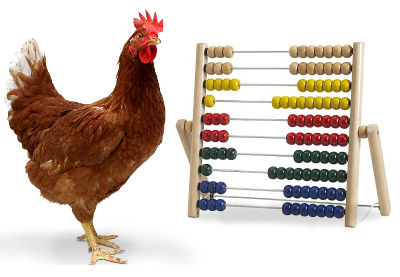Chicken intelligence
According to a recent study — aptly titled “The Intelligent Hen” — conducted by Bristol University professor Christine Nicol, chickens are capable of mathematical reasoning and logic, numeracy, planning ahead, self-control, transitive inference (if A>B and B>C, then A>C), and basic structural engineering. Baby chicks quickly learn object permanence, the idea that an object out of sight still exists, earlier than human babies.
The mental abilities of animals—particularly birds—have traditionally been underestimated. However, as we take the time to study what birds are really like, their intelligence and complex lives become very obvious.
Here’s what the experts say about chickens:
“[I]t is now clear that birds have cognitive capacities equivalent to those of mammals, even primates.” — Rogers LJ, The Development of Brain and Behaviour in the Chicken (Wallingford, Oxon, U.K.: CABI Publishing, 1995, p. 217).
“Dr. Joy Mench, Professor and Director of the Center for Animal Welfare at the Univ. of Calif. at Davis explains, ‘Chickens show sophisticated social behavior….That’s what a pecking order is all about. They can recognize more than a hundred other chickens and remember them. They have more than thirty types of vocalizations.’” — Specter, M., “The Extremist,” The New Yorker, April 14, 2003, p. 64.
“Chickens exist in stable social groups. They can recognize each other by their facial features. They have 24 distinct cries that communicate a wealth of information to one other, including separate alarm calls depending on whether a predator is traveling by land or sea. They are good at solving problems…Perhaps most persuasive is the chicken’s intriguing ability to understand that an object, when taken away and hidden, nevertheless continues to exist. This is beyond the capacity of small children.” — Grimes, W., “If Chickens Are So Smart, Why Aren’t They Eating Us?” The New York Times, January 12, 2003.
“‘They may be bird brains, but we need to redefine what we mean by bird brains,’ she told the British Association Festival of Science at Leicester University. ‘Chickens have shown us they can do things people didn’t think they could do. There are hidden depths to chickens, definitely.’” — Ananova, “Chickens ‘Not Just Bird-Brains,’” September 11, 2002. http://www.ananova.com/news/story/sm_668673.html
“Contrary to what one may hear from the industry, chickens are not mindless, simple automata but are complex behaviorally, do quite well in learning, show a rich social organization, and have a diverse repertoire of calls. Anyone who has kept barnyard chickens also recognizes their significant differences in personality.” — Rollin, B., Farm Animal Welfare: School, Bioethical, and Research Issues (Iowa State University Press, 1995, p. 118).
Of course, the chicken is far from being the only farmed animals with advanced mental skills. Fish can use tools to hunt, turkeys remember the geographic content of more than 1,000 acres and pigs can learn how to operate computers. With so many studies highlighting their amazing mental capabilities, the animals we often treat as mere meat-, milk- and egg-producing machines are incredibly bright, and can obviously process and feel pain, loneliness and despair when the routine cruelties of factory farming are inflicted upon them.
Want to help protect these intelligent feathered friends and other farmed animals? Head over to TryVeg.com for vegan recipes, tips and more.

